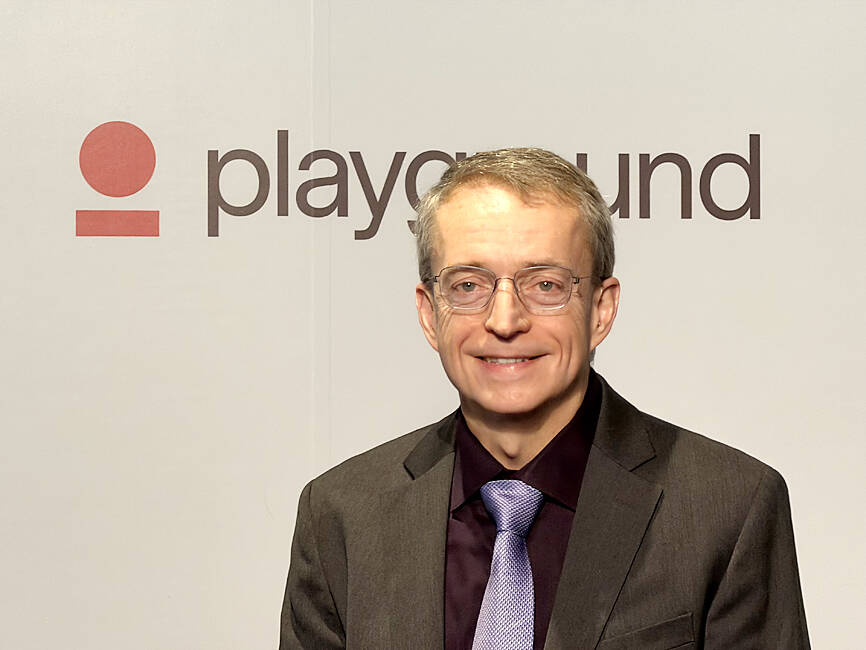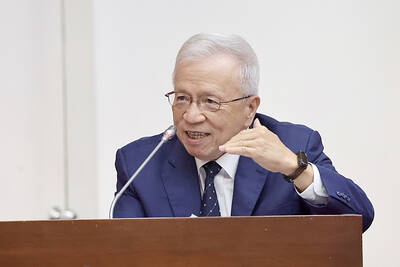Building a resilient energy supply chain is crucial for Taiwan to develop artificial intelligence (AI) technology and grow its economy, former Intel Corp chief executive officer Pat Gelsinger said yesterday.
Gelsinger, now a general partner at the US venture capital firm Playground Global LLC, was asked at a news conference in Taipei about his views on Taiwan’s hardware development and growing concern over an AI bubble.
“Today, the greatest issue in Taiwan isn’t even in the software or in architecture. It is energy,” Gelsinger said. “You are not in the position to have a resilient energy supply chain, and that, I think, puts your entire industry in a very precarious state. You need more energy resilience in Taiwan if you want to grow the economy of Taiwan.”

Photo: CNA
He said he did not expect the heavy AI infrastructure investments by the world’s major cloud service providers to cause an AI bubble burst soon.
“Maybe we’ll spend a couple of hundred million [US] dollars putting concrete in the base of building infrastructure. We will not spend billions of dollars on chips until we have energy availability,” he said. “And fundamentally, that becomes a buffer or a limiter.”
The AI industry is supported by solid business models to generate real profits, which is different from the dotcom bubble of 2000, he said.
Gelsinger said he is “supportive” of US President Donald Trump’s call for bringing more chip manufacturing to the US, as “everything rides on the foundations of semiconductors.”
“I believe that having more resilience of those supply chains is the best policy. For that, I’m very much supportive of the Trump administration wanting to see more built in the US,” he said. “That doesn’t mean there’s less in Taiwan. It just says more of a growth should occur in other geographies like the US.”
Gelsinger said Taiwan Semiconductor Manufacturing Co (TSMC, 台積電) should “have more advanced nodes, and more research and development in the US, because it simply is a better policy for the world.”
“It is so important to the future of the world,” he added.
Separately, former TSMC senior vice president Lo Wei-jen (羅唯仁), who retired in July, is expected to join Intel to help improve the US chipmaker’s foundry business, alarming authorities, local media reported.
The High Prosecutors’ Office yesterday opened an intellectual property theft investigation, while the Ministry of Economic Affairs approached TSMC to gain more understanding of the issue, the Chinese-language Liberty Times (sister paper of the Taipei Times) reported.
Prosecutors suspect that Lo allegedly attempted to obtain sensitive information about TSMC’s most advanced process technologies, including 2-nanometer, 16A and 14A technologies, it reported.
Lo joined TSMC in 2004 from Intel, where he held various positions in technology development and management.
TSMC and Intel declined to comment.

JITTERS: Nexperia has a 20 percent market share for chips powering simpler features such as window controls, and changing supply chains could take years European carmakers are looking into ways to scratch components made with parts from China, spooked by deepening geopolitical spats playing out through chipmaker Nexperia BV and Beijing’s export controls on rare earths. To protect operations from trade ructions, several automakers are pushing major suppliers to find permanent alternatives to Chinese semiconductors, people familiar with the matter said. The industry is considering broader changes to its supply chain to adapt to shifting geopolitics, Europe’s main suppliers lobby CLEPA head Matthias Zink said. “We had some indications already — questions like: ‘How can you supply me without this dependency on China?’” Zink, who also

At least US$50 million for the freedom of an Emirati sheikh: That is the king’s ransom paid two weeks ago to militants linked to al-Qaeda who are pushing to topple the Malian government and impose Islamic law. Alongside a crippling fuel blockade, the Group for the Support of Islam and Muslims (JNIM) has made kidnapping wealthy foreigners for a ransom a pillar of its strategy of “economic jihad.” Its goal: Oust the junta, which has struggled to contain Mali’s decade-long insurgency since taking power following back-to-back coups in 2020 and 2021, by scaring away investors and paralyzing the west African country’s economy.

BUST FEARS: While a KMT legislator asked if an AI bubble could affect Taiwan, the DGBAS minister said the sector appears on track to continue growing The local property market has cooled down moderately following a series of credit control measures designed to contain speculation, the central bank said yesterday, while remaining tight-lipped about potential rule relaxations. Lawmakers in a meeting of the legislature’s Finance Committee voiced concerns to central bank officials that the credit control measures have adversely affected the government’s tax income and small and medium-sized property developers, with limited positive effects. Housing prices have been climbing since 2016, even when the central bank imposed its first set of control measures in 2020, Chinese Nationalist Party (KMT) Legislator Lo Ting-wei (羅廷瑋) said. “Since the second half of

AI BOOST: Next year, the cloud and networking product business is expected to remain a key revenue pillar for the company, Hon Hai chairman Young Liu said Manufacturing giant Hon Hai Precision Industry Co (鴻海精密) yesterday posted its best third-quarter profit in the company’s history, backed by strong demand for artificial intelligence (AI) servers. Net profit expanded 17 percent annually to NT$57.67 billion (US$1.86 billion) from NT$44.36 billion, the company said. On a quarterly basis, net profit soared 30 percent from NT$44.36 billion, it said. Hon Hai, which is Apple Inc’s primary iPhone assembler and makes servers powered by Nvidia Corp’s AI accelerators, said earnings per share expanded to NT$4.15 from NT$3.55 a year earlier and NT$3.19 in the second quarter. Gross margin improved to 6.35 percent,